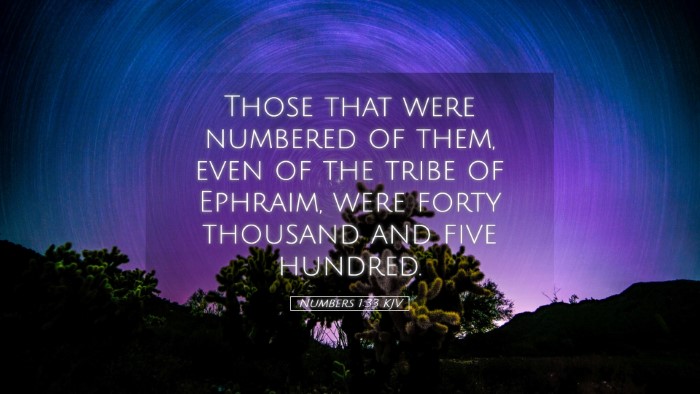Commentary on Numbers 1:33
Text of the Verse: "Of the children of Ephraim, by their generations, after their families, by the house of their fathers, according to the number of the names, from twenty years old and upward, all that were able to go forth to war;" (Numbers 1:33, KJV)
Introduction
This passage is part of a larger context in which Moses is instructed by God to take a census of the Israelites. Understanding this verse requires examining both its immediate context and its broader theological implications. Renowned commentators such as Matthew Henry, Albert Barnes, and Adam Clarke offer valuable insights that illuminate its significance, particularly regarding God's providence, the role of the tribes, and the nature of Israel's identity as a nation set apart for His purposes.
Historical Context
The book of Numbers marks a period of Israel's history shortly after their exodus from Egypt. The Israelites are on the brink of entering the Promised Land, and it is crucial for them to prepare militarily and spiritually. This census serves multiple purposes, including organization for war, resource allocation, and divine order. The mention of Ephraim specifically highlights the tribe's prominence among the house of Joseph, asserting its role within the larger narrative of Israel's inheritance and conquest.
Tribe of Ephraim
Commentator Insights:
- Matthew Henry: Henry emphasizes the prominence of Ephraim, noting that it was one of the leading tribes of Israel and often associated with strength and leadership. He points out how Ephraim's inclusion in the census illustrates God's choice of leaders within His covenant community.
- Albert Barnes: Barnes offers a thorough examination of the significance of naming tribes. He indicates that the genealogical details help affirm God's promises to Abraham, Isaac, and Jacob regarding their descendants, thereby establishing continuity in God’s plan.
- Adam Clarke: Clarke highlights Ephraim's military capabilities, asserting that their strength was vital for the forthcoming conquests. He also reflects on how God's providence is evident in organizing His people for their divine mission.
Theological Implications
This verse, while part of a historical census, conveys deeper theological truths central to understanding God’s covenant with Israel.
Divine Order
The structure of the census reveals God's desire for order within His people. Each tribe was numbered according to their ability to serve, signifying that every individual has a specific role in God’s plan.
- Community Engagement: Each member of the tribe contributes to the strength and identity of the whole community.
- Spiritual Readiness: The emphasis on those "able to go forth to war" underscores the necessity of being spiritually and physically prepared to fulfill one's role.
Identity and Calling
Numbers 1:33 highlights the identity of the Israelites as a nation chosen by God. This identity is not merely ethnic but is deeply rooted in a divine calling to be a light to the nations.
- Chosen People: The Israelites being called to war is symbolic of the spiritual battle that all believers face. Just as they were to prepare for physical conflict, so too must Christians ready themselves for spiritual warfare.
- Collective Responsibility: There is a collective aspect to their identity. Each tribe's involvement in the census speaks to the unity and diversity of the body of Christ, where different gifts and roles contribute to the mission.
Practical Applications
For modern pastors, students, and scholars, the lessons from Numbers 1:33 are both rich and varied. Here are several practical applications derived from this passage:
Preparation for Service
Just as the Israelites were numbered and prepared for battle, so too are Christians called to be equipped for service in the Kingdom of God.
Understanding Spiritual Warfare
The focus on being able to go forth to war invites believers to recognize the reality of spiritual conflict in their lives.
Valuing Each Member's Contribution
This passage emphasizes that every member of the community has a vital role. Encouragement and empowerment in the church should reflect this understanding of individual and collective identities.
Conclusion
In summary, Numbers 1:33 encapsulates a pivotal moment in Israel's journey, showcasing God's sovereignty, the importance of organization, and the collective identity of His chosen people. The insights from historical commentaries deepen our understanding, offering a holistic view that emphasizes God’s relentless commitment to guiding His people. For contemporary readers, it invites reflection on how each individual fits into God's grand narrative and the importance of readiness and unity in fulfilling divine purposes.


